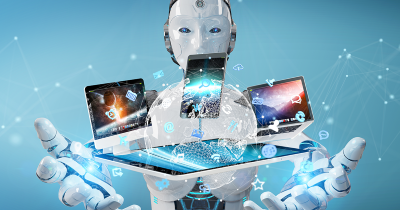Context-
AI journalism has revolutionised the way news stories are generated, enabling media houses to sift through vast amounts of data swiftly using pattern recognition algorithms. Despite common beliefs, AI has emerged as a pivotal tool for modern media outlets, facilitating the production of human-readable content at an unprecedented pace. In an era inundated with constant streams of news and abundant data accessible to everyone, the relevance of traditional news media, both print and electronic, begs examination.
Evolution of the Role of Media:-
● Traditional Perception of Media Role: Historically, media has been perceived as a means to inform, educate, and entertain, regardless of the medium—print, radio, or television.
● Evolution of Information Dissemination: The dissemination of information has evolved alongside technological advancements throughout history, from ancient methods like copper plates and paintings to modern innovations like the internet.
● Emergence of Digital Platforms: Recent decades have witnessed the emergence of various digital platforms for generating and disseminating news and information, eliminating the distance between creators and consumers of information.
● Pros and Cons of Digital Platforms: While digital platforms have reduced the distance between creators and consumers, they often lack traditional processes of curation, editing, and publishing, raising concerns about the quality and authenticity of information.
Role of Media in AI-Driven Society-
● Role of Artificial Intelligence (AI): AI-driven algorithms now personalize content consumption experiences, offering tailored news, entertainment, and advertisements based on individual browsing history and preferences.
● Transition to Personalized Services: AI-powered systems are increasingly offering personalized health services, education, entertainment, and other services, potentially leading to a future where individuals live in specialized compartments or amidst chaos and fragmentation.
● Uncertainty of AI's Impact: The future implications of AI-driven personalization remain uncertain, with time being the ultimate arbiter of its direction and impact on society.
● Role of Media in an AI-Driven Society: In an era dominated by algorithms, automation, and AI technologies like machine learning and neural networks, the role of traditional media is being redefined.
● Relevance of News Media: With an abundance of news and data accessible to individuals at their fingertips, the relevance of traditional news media outlets, both print and electronic, is being questioned.
● Rise of AI in Journalism: AI has emerged as a powerful tool for media houses, enabling automated news generation, fact-checking, and cross-verification of data in real-time, surpassing human capabilities.
● Impact on Journalism Practices: AI-driven technologies such as data journalism, algorithm journalism, and automated journalism are reshaping the production and dissemination of news, promising reliability and efficiency.
● Expansion Beyond News Media: AI's influence extends beyond news media into fields like music, entertainment, and book publishing, facilitating content creation, curation, and distribution with unprecedented accuracy and efficiency.
Concerns and Challenges with AI-Enabled Media: Despite its benefits, AI-enabled media poses challenges such as misinformation dissemination, context distortion, and privacy issues, raising concerns about reliability and ethical implications.
● Unpredictable Future of AI in Media: While AI promises to revolutionize media production and consumption, uncertainties remain regarding its impact on content authenticity, context, and societal dynamics.
● Synthetic Media and Augmented Reality: The emergence of synthetic media and augmented reality signifies a paradigm shift in media consumption, offering immersive experiences that blur the lines between reality and virtuality.
Conclusion
In conclusion, as artificial intelligence continues to reshape the landscape of media, its impact remains both transformative and uncertain. While AI-driven technologies promise efficiency and innovation in content creation and dissemination, they also raise concerns regarding authenticity, privacy, and ethical implications. As we navigate the evolving intersection of AI and media, careful consideration of these challenges alongside the potential for innovation is paramount to shaping a responsible and inclusive media ecosystem for the future.
|
Probable Questions for UPSC Mains Exam
|
Source- The Indian Express







